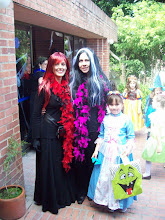jueves, 18 de marzo de 2010
DATA ANALYSIS OUTLINE
We have chosen ‘Grounded Theory’ to analyze data as this method helps develop inductively from a corpus of data acquired by us as participants-observers.“The grounded theory approach, particularly the way Glauser and Strauss (The discovery of grounded theory, 1967) developed it, consists of a set of steps whose careful execution is thought to “guarantee” a good theory as the outcome. Strauss would say that the quality of a theory can be evaluated by the process by which a theory is constructed.” (Borgatti, n.d). We attempt to qualify and support the quality of our theory by analyzing the data collected, following such process by applying Auerbach and Silverstein’s coding procedures.
WHEN: March 6th through 8th
WHAT: Open codingResearch concernsTo Look at field notes taken to identify indicators of categories in events and behavior name them, categorize them and describe phenomena found.
WHY:Contextualization and Interpretation To analyze data collected as descriptive, sentences and, paragraphs in search of the answer to our forts analysis question “what was the research about? Which phenomena were found? What is all the data that has been collected? How can it be categorized?
HOW:By reading and revising field notes and other data collected in order to conceptualize it (in nouns, verbs, adjectives and) and to identify and code them with numbers and colors.
RESEARCHERS' ROLE: Individual work for further comparison, and identification of common conceptualization and coding.
WHEN:March 9th and 10th
WHAT:Relevant textRepeating ideas
WHY:To compare codes to text to find consistencies and differences. The consistencies between codes (similar meanings or pointing to a basic idea)
HOW:Relating the text to concerns (the field notes, interviews, etc.)Looking/choosing information that directly relates to theresearch.ComparingCodes: consistencies and differences (for categorization)
RESEARCHERS' ROLE:Individual work to be shared and merged on March 10th, 2010.
WHEN:March 11th through 14th
WHAT:Themes and theoretical constructs
WHY:To reveal the first categories.
HOW:By relating categories to theoretical background to support those categories with constructs
RESEARCHERS' ROLE:Individual work to be complemented, including new theoretical findings.
WHEN:March 15th & 20thWHAT:Theoretical narrative WHY:To write the data analysis report
HOW:By following the procedure for academic writing.RESEARCHERS' ROLE:Collaborative work.
WHEN:March 21th
WHAT:Proofread Data analysis report.
WHY:To guarantee the quality of academic writing.
HOW:Peer proofreading
RESEARCHERS' ROLE:Individual work.
WHEN: March 6th through 8th
WHAT: Open codingResearch concernsTo Look at field notes taken to identify indicators of categories in events and behavior name them, categorize them and describe phenomena found.
WHY:Contextualization and Interpretation To analyze data collected as descriptive, sentences and, paragraphs in search of the answer to our forts analysis question “what was the research about? Which phenomena were found? What is all the data that has been collected? How can it be categorized?
HOW:By reading and revising field notes and other data collected in order to conceptualize it (in nouns, verbs, adjectives and) and to identify and code them with numbers and colors.
RESEARCHERS' ROLE: Individual work for further comparison, and identification of common conceptualization and coding.
WHEN:March 9th and 10th
WHAT:Relevant textRepeating ideas
WHY:To compare codes to text to find consistencies and differences. The consistencies between codes (similar meanings or pointing to a basic idea)
HOW:Relating the text to concerns (the field notes, interviews, etc.)Looking/choosing information that directly relates to theresearch.ComparingCodes: consistencies and differences (for categorization)
RESEARCHERS' ROLE:Individual work to be shared and merged on March 10th, 2010.
WHEN:March 11th through 14th
WHAT:Themes and theoretical constructs
WHY:To reveal the first categories.
HOW:By relating categories to theoretical background to support those categories with constructs
RESEARCHERS' ROLE:Individual work to be complemented, including new theoretical findings.
WHEN:March 15th & 20thWHAT:Theoretical narrative WHY:To write the data analysis report
HOW:By following the procedure for academic writing.RESEARCHERS' ROLE:Collaborative work.
WHEN:March 21th
WHAT:Proofread Data analysis report.
WHY:To guarantee the quality of academic writing.
HOW:Peer proofreading
RESEARCHERS' ROLE:Individual work.
lunes, 15 de marzo de 2010
Suscribirse a:
Comentarios (Atom)

